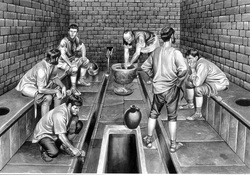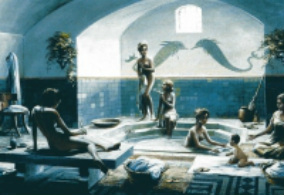 Roman "social" toilet
Roman "social" toilet Open defecation is the number one health issue in developing countries like India. What is open defecation? As it has come to mean today, it is about practicing defecation in open, public, and congested urban and semi-urban places that contaminate soil, and infect water ways, and thus become breeding ground for diseases.
Around the world, over six lakh children die of diarrhea and pneumonia every year, and about 88% of them can be linked to water contamination and sanitation issues. However, open defecation can be “social”, and good for health and nature. Globally, over 1.1 billion people are estimated to practice open defecation – about 60% of them are in India. But open defecation, as it is practiced in many rural settings, take place in airy, open, and natural places – near agricultural fields, water bodies, and foothills of forests that are home for insects, scavenger animals and birds.
In this context, open defecation can be better called as “social defecation”. It is good for society, health and nature. How? It is “social” because usually people of same gender, and maybe of same age group, defecate together during wee hours, whiling away their morning time chatting, and discussing. The water required for cleaning the body, after defecation, is less than half a litre per individual. Sometimes green leaves were used to wipe out waste from the body. Can there be an eco-friendly napkin better than leaves!?
Around the world, over six lakh children die of diarrhea and pneumonia every year, and about 88% of them can be linked to water contamination and sanitation issues. However, open defecation can be “social”, and good for health and nature. Globally, over 1.1 billion people are estimated to practice open defecation – about 60% of them are in India. But open defecation, as it is practiced in many rural settings, take place in airy, open, and natural places – near agricultural fields, water bodies, and foothills of forests that are home for insects, scavenger animals and birds.
In this context, open defecation can be better called as “social defecation”. It is good for society, health and nature. How? It is “social” because usually people of same gender, and maybe of same age group, defecate together during wee hours, whiling away their morning time chatting, and discussing. The water required for cleaning the body, after defecation, is less than half a litre per individual. Sometimes green leaves were used to wipe out waste from the body. Can there be an eco-friendly napkin better than leaves!?
 "social" bathing is a "social" therapy
"social" bathing is a "social" therapy Sociologists observe that bathing in common places (such as rivers, ponds or wells) in groups works as a social therapy, as people use the time to share their minds, give vent to their feelings and build friendships. All these happen in social defecation, and hence it is good for health.
Social defecation is good for nature. Human waste is food for many other living forms, great manure for plants, and plays an important role in eco-system services by way of helping seeds of consumed fruits see light of the day.
People that think open defecation is bad agree that western toilet and its centuries old flush system wastes too much space and water and hence it is not suitable for India, which is a tropical country. On an average, it takes about 10 litres of water per use of toilet. Imagine the colossal waste of water if all the 7 billion population starts using it every day – about 70 billion litres of water. Thankfully, 2.5 billion people do not have, use or access to toilets.
Closed toilets also affect the psych of people. Today, people shy away from cleaning the waste of their own children, and physically disabled or ailing elders. One of the reasons is that having brought up in houses with closed-toilets, they have developed a sense of disgust over human waste.
The government is spending about Rs 1,500 crore every year to construct public toilets, subsidize the cost of construction of toilets and septic tanks in houses, and to better sewage system for toilets. But we need new eco-friendly solutions. Many people and organizations are working on new technologies – bio-toilet is one of the promising ideas.
Due to all these effects, open defecation may become a thing of the past in the future. But hopefully there will be more people to write and tell how villages in India once had practiced social defecation, and eco-friendly toilet “paper” that were good for health, nature and culture.
Social defecation is good for nature. Human waste is food for many other living forms, great manure for plants, and plays an important role in eco-system services by way of helping seeds of consumed fruits see light of the day.
People that think open defecation is bad agree that western toilet and its centuries old flush system wastes too much space and water and hence it is not suitable for India, which is a tropical country. On an average, it takes about 10 litres of water per use of toilet. Imagine the colossal waste of water if all the 7 billion population starts using it every day – about 70 billion litres of water. Thankfully, 2.5 billion people do not have, use or access to toilets.
Closed toilets also affect the psych of people. Today, people shy away from cleaning the waste of their own children, and physically disabled or ailing elders. One of the reasons is that having brought up in houses with closed-toilets, they have developed a sense of disgust over human waste.
The government is spending about Rs 1,500 crore every year to construct public toilets, subsidize the cost of construction of toilets and septic tanks in houses, and to better sewage system for toilets. But we need new eco-friendly solutions. Many people and organizations are working on new technologies – bio-toilet is one of the promising ideas.
Due to all these effects, open defecation may become a thing of the past in the future. But hopefully there will be more people to write and tell how villages in India once had practiced social defecation, and eco-friendly toilet “paper” that were good for health, nature and culture.

 RSS Feed
RSS Feed
